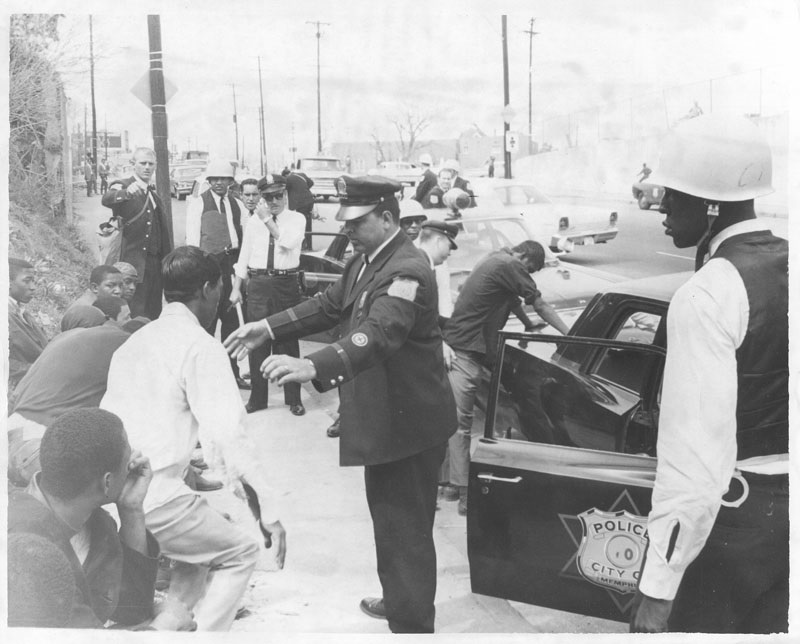
“Booker T Students Arrested.” Volunteer Voices: The Growth of Democracy in Tennessee. Original Image: Special Collections Dept., University Libraries, University of Memphis.
March 21, 1968
A new crackdown by city authorities on students skipping school aims to quiet some of the violence associated with the ongoing sanitation workers strike.
However, critics of the move allege it is more about clamping down on protests against the city than it is about restoring order.
According to Rev. James Lawson, a key supporter of the strike, the order by Juvenile Court Judge Kenneth Turner directly threatens plans for a massive protest march scheduled for this Friday.
The order states that police are to arrest all youths under 16 not in school during school hours. The order has already resulted in the arrest of a number of youth, which has hampered pro-strike protests since students provide a significant portion of the manpower for the demonstrations.
When asked for comment, Rev. Lawson stated, “We are expecting to have 10,000 in the march-school children included. We’ll fight the truancy order in the courts if need be.” The march, tentatively being called the March for Justice and Jobs, will be led by Dr. Martin Luther King Jr.
King has called for a general work stoppage within the Memphis black community on that day to bring the city to its knees and to bring the mayor to the negotiating table.
The order from Judge Turner further states that any adults who encourage students to skip school are to be subject to arrest. Technically, King who has urged students ahead of Friday’s march to “not go to schools” could be seen as being in violation of the judge’s order as would a number of local ministers supporting the strike.
Rev. Harry Middlebrook, for instance, is the unofficial youth minister for COME, a group of local ministers working to support the strike. Over the course of the past month, he has led a number of youth marches through downtown in support of both the strike and the economic boycott. One demonstration involved 300 young people holding a mock funeral for justice, complete with casket, outside city hall while other demonstrations have involved students actively blocking garbage trucks.
At times, groups of nearly a hundred students have left classes at schools such as Northside High to participate in protests. According to Rev. Middlebrook, there were plans at one point in early March for as many as 2,000 students to take part in a day of marching, picketing, and tying up traffic. However, the idea came to nothing. There have also been student protests in predominantly white East Memphis against branches of major downtown businesses.
Despite the occasional success of student led marches, youth involvement in the strike has been a double-edged sword for COME, which has sometimes found it difficult to maintain discipline. When asked for his opinion on reports of juvenile hooliganism, Memphis Fire and Police Director Frank Holloman directly blamed local ministers who support the strike, “These young people go to meetings, are inflamed by fiery speeches, then disperse in small groups and are able to create havoc…. How their [the COME ministers] consciences condone it is beyond me.”
In one incident, police arrested nine youths for breaking windows at a Loeb barbeque joint and a nearby grocery store. In another, a 70 year old man alleged that two youths, who were part of a group picketing downtown stores, assaulted him. There has been at least one report of students at a local junior high school throwing rocks and bottles at a squad car.
It is incidents like these that have given officials an opening to crack down. For example, Director Holloman, armed with Judge Turner’s March 15 order, has promised that any students found out of class during regular school hours will “be arrested no matter what they’re doing and charged with truancy” while superintendent of city schools E. C. Stimbert has reiterated the school board’s lack of tolerance for unexcused absences ahead of the upcoming demonstration.
Either way, plans for the Friday march set up a further area of conflict between supporters of the ongoing strike and the city since they are likely to run smack into city efforts to clamp down on truancy.
Adams, Null. “City Vote Looms on Dues Check-Off.” Memphis Press-Scimitar (Memphis, TN), Mar. 16, 1968.
Porteous, Clark and Brown, Charles A. “Churchill Puts 116 on Probation.” Memphis Press-Scimitar (Memphis, TN), Mar. 6, 1968.
Porteous, Clark. “Council ‘No’ to a Dues Checkoff.” Memphis Press-Scimitar (Memphis, TN), Mar. 7, 1968.
Ryan, George. “Truancy Crackdown Ordered By Judge to Curb Rowdyism In Garbage Strike Madness.” Commercial Appeal (Memphis, TN), Mar. 16, 1968.
Unknown. “Federal Judge Again Refuses Strike Hearing.” Memphis Press-Scimitar (Memphis, TN), Mar. 5, 1968.
Unknown. “Two Arrested at School In Garbage Strike Efforts.” Memphis Press-Scimitar (Memphis, TN), Mar. 11, 1968.
Unknown. “Strike Stalemate Persists.” Memphis Press-Scimitar (Memphis, TN), Mar. 12, 1968.
Unknown. “9 Sympathizers to Strikers Jailed in Downtown Incident.” Memphis Press-Scimitar (Memphis, TN), Mar. 13, 1968.
Unknown. “Police Seek Two Who Beat Man.” Memphis Press-Scimitar (Memphis, TN), Mar. 14, 1968.
Unknown. “Grand Jury Indicts Eight Garbage Strike Supporters.” Memphis Press-Scimitar (Memphis, TN), Mar. 15, 1968.
Unknown. “Staff Photo-Strike Supporters.” Tri-State Defender (Memphis, TN), Mar. 16, 1968.
Unknown. “King Plans to Return for March: Demonstration Set for Friday.” Memphis Press-Scimitar (Memphis, TN), Mar. 19, 1968.
Unknown. “City Braces for March.” Memphis Press-Scimitar (Memphis, TN), Mar. 21, 1968.
Unknown. “12,000 Fill Up Mason Temple for King Talk.” Tri-State Defender (Memphis, TN), Mar. 23, 1968.
Beifuss, Joan Turner. At The River I Stand. 2nd ed. Memphis: St. Luke’s Press, 1990.
Honey, Michael K. Going Down Jericho Road: The Memphis Strike, Martin Luther King’s Last Campaign. New York : W.W. Norton and Company, 2007.






